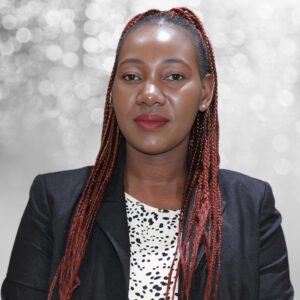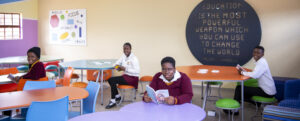As we observed Child Protection Week from 27 May to 02 June, the Adopt-a-School (AAS) Foundation called upon government, NGOs and civil society to combine their efforts to protect vulnerable children against neglect, abuse and exploitation. Unless children are properly nurtured and protected from harm, no amount of improvement to schooling will yield better educational outcomes.
“A child’s ability to learn is not only affected by the quality of teaching, the state of their classroom and the quality of their books. It is affected by their health, well-being and state of mind,” says Bernice Maponyane, Social Worker and Programme Manager at Adopt-a-School Foundation. “A scared or hungry child, or one who has experienced physical or emotional abuse at any stage in his or her young life, will struggle to concentrate and learn,” she continues.
Children who suffer abuse or neglect often react by becoming withdrawn or anti-social. Some become disruptive or even violent at school, bullying other children and forming gangs. Many of these children drop out of school and are at increased risk of drug and alcohol abuse. Dropping out of school is directly linked to significantly lower incomes throughout life.
In order to address these issues, AAS has launched a number of programmes at schools in underprivileged areas. The most ambitious of these programmes identifies vulnerable children in schools and intervenes directly in their lives.This programme is currently in its pilot phase in Diepsloot Combined School in Gauteng and at eight schools in Botshabelo in the Free State.
In Botshabelo, AAS will be establishing a Safe Park where children can complete homework under supervision and benefit from remedial and reading programmes in a safe environment. In addition to educational support, this programme facilitates peer support groups, structured life skills programmes and HIV/AIDS prevention programmes. The programme also gives social workers the opportunity to detect and identify signs of abuse.
“Many of these children have little or no adult supervision and are vulnerable to situations of abuse and exploitation. These Safe Parks will offer a protected and nurturing space for these children to flourish,” says Donne Nicol, CEO of Cyril Ramaphosa Foundation, the funder for this pilot project.
In recognition of Child Protection Week, AAS conducted a road show at the eight pilot schools in Botshabelo on the Thursday, 01 and Friday, 02 June 2017. The road show was hosted in collaboration with the National Association of Child Care Workers, Botshabelo Education Committee, the Department of Education‘s School Safety and Inclusion units, and the South African Police Services. The road show included workshops on children’s rights and protection, education on the procedures for reporting abuse cases, and the distribution of posters and pamphlets. The first informal safe park will be set up during this road show.
AAS also participated in an Indaba session on Stateless and Undocumented Children, hosted by the Department of Social Development in Gauteng during Child Protection Week. The workshop was attended by the Department of Education, the Department of Home Affairs, the Department of Justice, Lawyers for Human Rights and other local NGOs. Undocumented Children is a widespread problem in South Africa, and one of the key welfare issues on AAS’s agenda.
On 07 June 2017 AAS hosted a working forum at Lehlasedi High School in Mpumalanga, in collaboration with the Department of Social Development (Shatale office) and Ebenezer (a child welfare NGO) and on 16 July, ran an awareness campaign at Kgomotso High School in Pampierstad, Northern Cape.
“While it is invaluable to have a week dedicated to child protection in order to create the much-needed awareness for crimes against children in our communities, the subject is on our agenda throughout the year,” says Maponyane. “School is very often the first place issues of neglect or abuse are noticed. By ensuring educators are equipped with the knowledge to handle these sensitive issues, we can ensure that the correct action is taken,” she continued.
Schools are often at the centre of communities and the Foundation uses this platform to create a network of stakeholders in the area; ensuring schools and families can access various services and understand the processes in reporting crimes against children.
“The public has the most important role to play in terms of speaking up and out against violence against women and children,” says Maponyane. “Our silence normalises violence in our communities and has a lasting impact on the way society views and deals with violence. We must come together to expose and address these issues,” she concludes
For more information on Adopt-a-School visit the Foundation’s website at www.adoptaschool.org.za, email info@adoptaschool.co.za or call 011 592 6430.
References:
* Domestic abuse of children severely reduces their educational achievement (http://www.econ3x3.org/article/domestic-abuse-children-severely-reduces-their-educational-achievement)


